#Ptahhotep
Explore tagged Tumblr posts
Text
Kemeticism Under the Advice of Ptah-Hotep:
Maxim 5
In this maxim, Ptah-Hotep teaches about the proper behavior of a leader who respects the unending Rule; the philosophy of Ma'at.
Translation:
If you have the responsibility of leadership, are in charge of setting guidelines for a large number of subordinates, seek every opportunity to be effective so your behavior is irreproachable.
Great is the Rule – its effect on both great and small is complete and long-lasting. The Rule is illuminating and practical and has not changed since the time of Osiris.
Those who break the law must be punished – something the greedy fail to understand. Wrong-doers can achieve material gain, but evil never leads to good. It is wrong to say: 'I want only to take things to enrich myself,' rather than: 'I want my actions to benefit the position entrusted to me.'
Whenever anything reaches its due term, it is the Rule which endures. And a just man must acknowledge the domain of his spiritual father.
Breakdown:
Lesson
Jacq's Translation
Direct Translation
(Note: I will be using numbers here instead of asterisks since the number of asterisks will get confusing and distracting with the amount of author's notes I have on the terms used here.)
Be effective with your tasks and advice so that none can criticize your guidance.
“If you have the responsibility of leadership… seek every opportunity to be effective so your behavior is irreproachable.”
“If you are a leader in charge of giving guidelines to a large number (of people), seek, for yourself, every occasion to be efficient¹, so that your behavior² is irreproachable.”
Ma’at’s effect on all things big and small is whole and thorough, leading to enlightenment, knowledge of morality and its' practicality, and the universe.
“Great is the Rule… it’s effect on both great and small is complete and long-lasting. The Rule is illuminating and practical and has not changed since the time of Osiris.”
“Radiant, luminous, useful is the Rule, durable its precise efficiency³. It has not been disturbed⁴ since the time of Osiris.”
People who do not follow Ma’at must be punished. Those who are greedy will not understand why Ma’at must be upheld, or why those who do not follow it must be punished.
“Those who break the law must be punished – something the greedy fail to understand.”
“The one who transgresses the laws is punished, and that is what escapes the attention of the one with a greedy heart.”
Cruel and evil people can gain many material possessions but this evil path will never succeed; it can never fulfill its objectives.
“Wrong-doers can achieve material gain, but evil never leads to good.”
“Iniquity will get hold of quantity⁵, but evil⁶ will never succeed in bringing its moment of action safely into port.”
Taking things only for oneself is wrong and evil; it is better to think about the improvement of those around you within your life, as well as for your own needs, but not more.
“It is wrong to say: “I want only to take things to enrich myself.” rather than: “I want my actions to benefit the position entrusted to me.””
“The one who acts wrongfully says, “I acquire for myself”; he does not say: “I acquire for the benefit of my function.”
Although all things pass and die, Ma’at’s Rule remains. This makes all things temporary, except Ma'at, which is eternal.
“Whenever anything reaches its due term, it is the Rule which endures.”
“The end comes, the Rule remains.”
A good spiritual son must put to realization and acknowledgement the lessons and the work of their spiritual father.
“… and a just man must acknowledge the domain of his spiritual father.”
“That is what a just man says: “Such is the domain of my spiritual father.””
(1) - Efficient; menekh, implies a work that is well-adjusted and well finished; overall well-rounded.
(2) - Behavior can also be translated as ‘your way of governing, of guiding’.
(3) - Precise efficiency is translated from seped, which means to be pointed and efficient. The Rule of Ma’at always reaches its aim and never fails when it’s guidance is heeded. Characteristics include its duration, its eternity, stability, and in alter ability; as the worst interference or misappropriation from humans cannot defile or alter it.
(4) - Disturbance here is indicated by a verb, khenen, describing serious troubles and their consequences. The sign specifying the category of idea it belongs to is the Set-animal, representing the God responsible for cosmic disturbances. Ma’at’s Rule is not harmed by these disturbances. “Being at the origin of every creation, it is neither weakened nor lessened by this creation. ‘The time of Osiris’ is that of eternity. Born within the dimension of time, our world and the human race are condemned to disappear, but Ma’at and Osiris, not subject to time, will endure.” (The Wisdom of Ptah-Hotep, Christian Jacq, p. 160)
(5) - Iniquity is translated from nedjyt, meaning baseness or villainy, whilst quantity is translated from ahat, meaning heap, piles, accumulation, or quantity. “Injustice gains unfair advantage wherever quantity is important. While the Rule of Ma’at and quality reign, baseness does not predominate; when quantity, mediocrity and injustice reign, it becomes widespread.” (The Wisdom of Ptah-Hotep, Christian Jacq, p. 160)
(6) - Evil here comes from the word djayt, formed from the root dja, meaning to transgress or oppose. One who is quarrelsome is one who transgresses and opposes, causing isfet within an environment of Ma’at.
With the length and range of this particular maxim, there are a lot of lessons that can be found within its' paragraphs. The overarching idea is concerned with Ma'at. Whilst it refers mostly to one who holds the position of a leader, Ma'at is something that all should aim to follow. It is the eternal and everlasting essence and substance of the universe – it is all things with equilibrium, balance, and harmony. It cannot be twisted or swayed by the outcome of its' own creation, nor can it even be harmed by the Gods.
I have spoken before about what Ma'at is, and who Ma'at is, in a cosmic sense. But this does not specifically describe what adhering to Ma'at means. So, Ma'at is the precision and the eternity and the essence of the universe. It is the substance. But what does it mean to follow this substance? What does it mean to adhere to equilibrium?
Often when people first begin to read about Ma'at, they read first the 42 Laws, also called the 42 Negative Confessions. They think of these laws as strict, unbending, stern, and intransigent. But harmony has nothing to do with the ideas that these words describe. Ma'at is something that is highly personalized to everyone and everything. The 42 Negative Confessions, even though seemingly a strict set of rules, was different for every person, and every time a version of this text has been found it has been different from every other version. This is because people with different lives and statuses have different vices, or sins which they are pulled to. The life of a vizier is very different from the life of a farmer, and so their vices are different. Whilst a vizier may be pulled to embezzle money, a farmer would be tempted to steal a neighbor's cow. A priest may need to ensure that he is being respectful in all holy places, while a governor may want to keep from the sin of adultery. Similarly, our good deeds will be different as well, and this is why Ma'at is so changeable. As said by Ptah-Hotep, the daily deeds of a sage are to follow the callings of his creative energy, his ka, which knows better of Ma'at than the mind, who is so easily swayed by the emotions which stem from the gut.
Whether or not we follow Ma'at, She is always there. Knowledge of Her will lead to great joy and heals the heart, whilst ignorance of Her leads only to failure and to isfet. The true freedom of human choice consists of taking part in the Great Divine Plan or departing ourselves from it; from accepting fate and entering into a state of Blessedness, or refusing and wandering in sorrow as we wonder helplessly how to control our destiny. The Gods are the ones to lead our destiny, and though humans have the capability of ignoring this and creating chaos, it is only what They ordain which comes to pass. It is our duty to trust Them and realize They know better than our transient minds do. It is hubris to believe you know better than the Gods.
In Egyptian mythology, there is little to no mention of any sort of hell. This concept comes from later cultures and was then imparted upon Kemetic thought, however in its' original form, the only thing to come after death to those who did not follow Ma'at was nonexistence. For the people of the time, this was enough punishment, as there was nothing better than life and its' continuation in the Field of Reeds, where all is peaceful and the sun shines forever. But for us, in our modern age which is steeped heavily in the idea of a monotheistic, Semitic God and the concept of Hell, the idea of nonexistence being the punishment for perpetrators of isfet seems to be somewhat lenient. However these wrong-doers were also to be punished in life. Ptah-Hotep outlines that those who are greedy, and those who do not understand what Ma'at is, will not understand why Ma'at must be followed or why they must be punished for their transgressions. In future maxims, Ptah-Hotep once again brings up this subject in reference to training a spiritual son – in our terms, a sage's apprentice. A spiritual son may act out of line or without Ma'at in mind; this does not mean you send him away immediately. Instead, he must be punished in a way that makes him understand his transgression, and if he understands, all is well. However if one repeatedly creates problems and does not listen to his ka, Ptah-Hotep advises to "... send him away. He is not your spiritual son." (Maxim 12)
The difference between the one who acts viciously and the one who acts within Ma'at is the ability to listen. If one is able to listen, they are able to understand. If they are unable to listen then their tasks in life will not succeed. "He who does not listen is prey to distractions. He who knows gets up early in the morning to worship, to maintain his balance, while an ignorant man bustles about." (Maxim 40, Epilogue 3)
It seems, in positions of power during both the past and the present, that those who are the least well-suited to be handling power are given it. As quoted above from this maxim, "Wrong-doers can achieve material gain," however, "evil never leads to good." (Maxim 5) So let us first ask, what does material gain give us? Everything material is temporary. Ptah-Hotep does not shun the importance of material goods. Food keeps us alive and nourishes us, and we require air to breathe, and water to drink, and it is good to have all these things in good quality. What he advices against is excess. When quantity of things becomes more important than the quality of these things, greed and a lack of appreciation derive. This is from an inability to see things as they truly are, and comprehend the world with no preconceived notions or feelings.
When we are able to see clearly, we appreciate every small thing, and are conscious of everything we have, and everything we are fortunate enough to not have, such as diseases or bad relations. We can see bad things which are out of our control and not react negatively to it, instead observing our emotions without reacting, and acting positively when it is possible. This perceived lack of emotion, as well as the understanding of material wealth's temporary state, does not mean we cannot enjoy good things; it actually gives us more power and awareness to enjoy and adore the good things in our life without being plagued by isfetic forces beyond our help, and without our hearts being warped by the instincts and fears of the gut. Without this clear vision, we rely on external and material things to keep us happy which are, as Ptah-Hotep says, temporary. This means our happiness would be temporary, as it is based on temporary things. "The end comes, the Rule remains." (Maxim 5) When happiness is based on the eternal, which is comprehension and realization, devotion, and perfect listening, then our happiness is eternal. Understanding and realizing this subject can be difficult. Understanding is easy enough; that appreciation leads to happiness, while the accumulation of things does not give any. But enacting it within your mind is a step of enlightenment, or realization, which does not always come easily.
The second question to ask when analyzing the phrase, 'wrong-doers can achieve material gain, but evil never leads to good,' is why is it possible for wrong-doers to achieve material gain?
Those who do not listen, the followers of isfet, who pay more heed to their gut than their heart, have their place in this world. Their evil ways are centered on getting their material gain no matter the cost to their soul or to the people around them. Their means are cruel and their behavior is to be despised. Temporary, material pleasures have more worth to them than the infinity of their souls, or the connection between humans. They do not see value in these things; they do not listen, and only see the value in material gains, but cannot see far enough to realize that these benefits will never last, and can be taken away in a second. Wrong-doers achieve material gain because they are set on it in their mind. It is the only thing important to them. The Gods always punish them with their fate, but this punishment is not visual to us.
This lesson bleeds into the next phrase, which says it is better to earn and achieve things for the benefit of your function, but not to yearn ceaselessly for more quantity. When one understands the quality of the goods we consume they do not yearn for quantity. They appreciate what they have in the moment and let it pass on like a pleasant dream. Peace follows and Ma'at is adhered to.
The lesson of Ma'at's eternity is one that I have repeated many times. Ma'at is enduring and beautiful, and She cannot be changed; however, Her presence can be diminished as more and more people forgo the Rule. That's why it is of paramount importance to listen to the sages who dedicate their lives to the understanding of Ma'at, whether from Egyptian culture or otherwise, as Ma'at is a universal subject found in many cultures. A 'spiritual father' is one who is a teacher. To us, we would call him a spiritual master, and his 'spiritual son' a disciple. The line of knowledge is not always genetic, and often we are able to choose our teachers and the style of knowledge we acquire. If the teachings are good, then the learning is good, and the learning is passed on, even over the millennia.
51 notes
·
View notes
Text

#books#education#critical reading#study#neptunianmind#neptune#books and reading#mercuryneptune#educate yourself#worldview#ptahhotep#neptunian#african spirituality
5 notes
·
View notes
Quote
Do not be arrogant because of your knowledge; approach the unlettered as well as the wise. The summit of artistry cannot be reached nor does craftsman ever attain pure mastery.
Ptahhotep, Echoes of Egyptian Voices: An Anthology of Ancient Egyptian Poetry
12 notes
·
View notes
Quote
Be silent when you hear speech until you know how to reply. Then you will increase your knowledge, and your words will be worth more than theirs.
Maxim 14 of Ptahhotep ((2498 BCE to 2345 BCE)
#Ptahhotep#ancient egypt#chat gpt#egypt#history#meditation#guru#learn#education#truth#be quiet#listen#knowledge#yoga#gnanayoga#jnanayoga
4 notes
·
View notes
Text
Ptahhotep: Ancient Egyptian Vizier and African Philosopher
Ptahhotep, also known as Ptahhotep I, is renowned as an ancient Egyptian vizier who graced the courts during the late 25th century BC and early 24th century BC Fifth Dynasty of Egypt. His wisdom and insights have solidified his position as one of the earliest known African philosophers, leaving an indelible mark on history. During the reign of Pharaoh Djedkare Isesi in the Fifth Dynasty,…

View On WordPress
#African History#African philosophers#ancient Egyptian vizier#Ancient Egyptians#ancient egyptians history#philosophy#Ptahhotep
1 note
·
View note
Text

5: How to treat a wife
If you marry a woman who is plump and jolly and well known by her townsfolk, if she is faithful and time is kind to her, do not be driven apart, but let her eat, for her jollity brings contentment.
From The Teaching of Ptahhotep, c. 1850 BCE, translated by Toby Wilkinson.
In other translations "frivolous", "wanton" or "of good quality" have been used instead of "plump". Apparently the Egyptian term is unknown, so several translations have been suggested by various scholars.
359 notes
·
View notes
Text
For the most momentous matrimony...
...of my dear friends @esteemed-excellency and @captain-francis-dargor, we are gathered here today, on a most omnious day, to unite in an uttermost cursed and defiling union these two nefarious, corrupted souls soul and abomination in unholy matrimony, under the star-carved auspices of the Scarab, so that the water may darken, the heart-flames may churn, and we may soar once more under the glorious loving light of the SUN
I sing to the Gods,
shining in Havens beyond our sight
I sing for those below,
resting in shadow, among the Reeds
The bargain is struck
they ordered it so
Bask now in the glory of lives entwined
as the waters of the River flow
May their hearts bloom with power
and their household fill with riches
Exalted now, they walk together
planting love brings sustenance.
Blessed now, their joy is together,
there is no tomb for the greedy-hearted.
Revel in the moment, let them enjoy
joyfulness is what marks calm water.
And when the face is turned back to you, after a Storm,
there follows peace before your ka,
for it is the ka that loves to listen,
and it is together that you are unstoppable.
Will you not stand together before the Reckoning?
#fallen london#hiram hargrave#captain francis dargor#I've taken a few sentences directly from the Maxims of Ptahhotep#check it out it has some cool lines all the way from 2350ish B.C.
17 notes
·
View notes
Text
Hello 🙂 I thought I would give a little introduction. You can call me Akhet.
I’m Kemetic, mainly a devotee of Nut, Nefertum, and Ptah. there are other Netjeru i worship, but They are the main three.
I wanted a place to share some of my less personal works of art and devotional hymns that i’ve written, so i made this blog! not sure how much i will share but i’m looking forward to being more active in the kemetic community 😁 feel free to talk to me, i love discussing the Gods and philosophy, some of my biggest areas of study are Ptahhotep and cosmology, as well as general ancient Egyptian culture and architecture. so if you have questions or just want to talk i am usually free 💛
thank you for reading!
šm m htp!
9 notes
·
View notes
Text
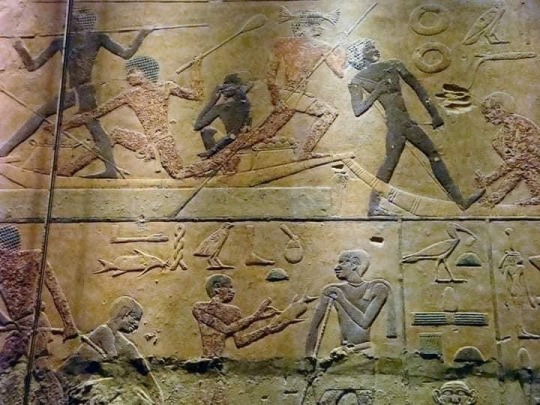
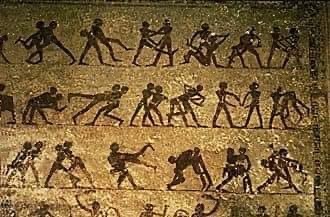

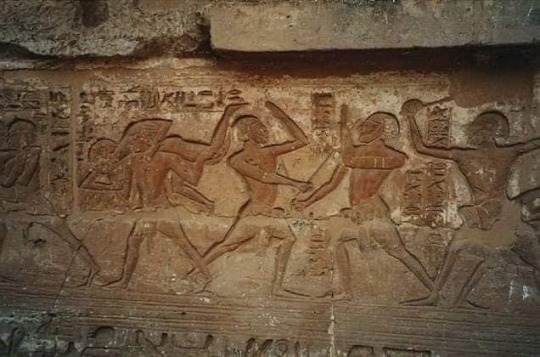
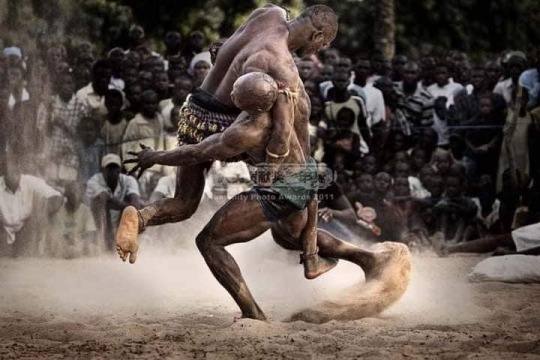
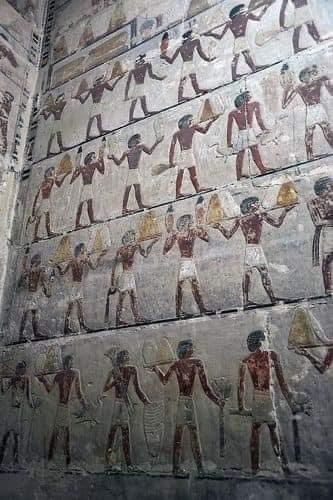
ORIGIN OF THE OLYMPICS:
Two thousand years before the first Olympic games were held in ancient Greece, sports had been created and played Amongst the Africans, including the ones dwelling in KMT and Kush aka Nubia.
In the tomb of Baqti III the wrestling scenes are painted across the east wall. The action of the wrestlers can be followed easily by the color scheme. The sequence of the wrestling begins with the placement of this bit of equipment that often belongs to the sport of wrestling. The next scenes picture the exploratory moves and the first attempts at a hold. Swings and throws follow in the swift alternation with positions on the ground. The scenes which follow swiftly one after the other, are like a cinematographic reproduction of a sequence.
Of all the Egyptian sports disciplines, wrestling has the best visual documentation. The first depiction of wrestling occurs on the cities palette from the time of the kingdoms. A wrestling pair is obviously utilized as a hieroglyphic. The six snapshots of a wrestling match from the tomb of Ptahhotep (Fifth Dynasty) are complete free of any emblematic character. Ptahhoteps son Achethotep who shares the tomb with his father, fights as youth against a friend his own age. These type of sparring session still go on in Africa today
104 notes
·
View notes
Text
Kemeticism Under the Advice of Ptah-Hotep:
Maxim 3
As mentioned in my previous post, maxims 2-4 concern themselves with debate amongst adversaries of equal, lesser, and greater footing. This maxim deals with an opponent of equal stature.
Translation of Maxim 3
In debate with an equal opponent, your skill is shown to its best advantage if you remain silent while he flounders in speech. The audience will be unmoved by his arguments while your reputation will soar in the eyes of the great ones.
Breakdown:
Lesson
Jacq's Translation
Direct Translation
It is better to remain silent in arguments with an equal adversary.
“… your skill is shown to its best advantage, if you remain silent while he flounders in speech.”
“If you get into a debate with your equal… make sure that you act so that your superiority (your skill) is manifest by silence, while he expresses himself badly.”
Pride through attempting to protect your image is a downfall that will lead to failure. One's words must be chosen carefully.
"... your skill is shown... if you remain silent... your reputation shall be perfect in the spirit of the great ones."
"... act so that your superiority is manifest by silence... your reputation shall be perfect in the spirit of the great ones."
Those who talk more and talk over other people often fail in their speech.
“… while he expresses himself badly (as you are silent). Those who listen to him will think badly of him whereas your reputation shall be perfect in the spirit of the great ones.”
“Those who listen to him will think badly of him, whereas your reputation shall be perfect in the spirit* of the great ones.”
* - Also translated as, 'in the knowledge of the great ones,' in the Prisse Papyrus.
Ptah-Hotep highly advises quietude as a positive attribute, and negates the aim of putting down an opponent with emotion. This shows both a great deal of wisdom, as well as a distinct absence of pride. An absence of pride, and in its’ place a lifestyle of asceticism is typically considered an eastern concept from the religions of Buddhism and certain sects of Hinduism. However within Ptah-Hotep’s advice exist inklings of a school of thought familiar to the east; one which encourages certain aspects of asceticism.
Speech in argument is often mired in pride. There is a distinct need and desire to protect your image in the minds of onlookers and listeners, who may judge you for being 'put down' by the words of your opponent. But why does one fear the judgement of others? Pride is something we all constantly carry, given to us by the notion that we are in any way special, whether especially good or bad. Generally, however, pride’s self-importance gives us a sense that we are better. But even the idea that we are better than animals, better than plants, is misled. All things are equal in their worth, because in truth there is nothing that has any tangible worth. Death rids us, and every other thing on earth, of any worth. As the Teachings of Prince Hordedef state,
“Accept that death humbles us, accept that life exalts us, the house of death is for life.”
Death makes us humble. It takes away our worth and makes it so we are all equal.
Life exalts us. It makes us feel wonderful, and does wonderful things for us, but this exaltation is temporary. Does it mean that this exaltation is false? Is it a lie? I do not believe so. As temporary as our worth on this planet is, it is true in that moment, but it can be taken away in a second, which is why it is bad to base any of your ka's worth on your material worth.
Death and its' many rituals and accompaniments are an honouring of life. As soon as death takes away our material worth, it gives us spiritual worth, and ascends us into a state of Blessedness. Material worth and material desire, including such things as pride, our money, our status, and even our material bodies, are temporary and fleeting.
This state of Blessedness after death is something achieved by all who follow Ma'at and the yearnings of their creative energy, their ka. But it is something that can be achieved during life, and something that can make one happy and enriched for all time; enriched not by the material wealth they congregate, but by the great spiritual mind which acts purely upon Ma'at and the happiness of the Gods, no longer attached to temporary pleasures and the uncontrollable emotions which flood from the gut, our place of primitive emotion.
Control consists not of a lack of material desire, but having desires and being able to not succumb to them, which may then lead to a lack of material desire. Control means no material desire, no pride that is succumbed to, and thus well-expressed thoughts and words that are not hindered by pride and the workings of the gut, instead inspired by the workings of the ka, your heart.
22 notes
·
View notes
Text
Shapeshifter Ben sister au:
Whenever Ben and Jenny visit their ammitu khufan relatives, Ptah-hotep, Aziza's dad would try to teach young Jenny how to be patient by introducing her to some hard games that require patience.
Jenny failed her game eight times, and Ptahhotep was like, "Hmm...she needs more practice."
Shapeshifter Ben belongs to @sweetpeaches666
Shapeshift Ben Sister au, aziza, ptahhootep, ammit khufans belongs to me
Ben 10 belongs to man of action.
#Ben 10#shapeshifter ben#Jenny Tennyson#Ben Tennyson#shapeshifter sister au#Ben 10 au#aziza#ammitu khufan#ptahhootep
8 notes
·
View notes
Quote
More hidden than gems is chiseled expression.
Ptahhotep, Echoes of Egyptian Voices: An Anthology of Ancient Egyptian Poetry
4 notes
·
View notes
Text
Ptahhotep: Ancient Egyptian Vizier and African Philosopher - Pan African Central Core



2 notes
·
View notes
Text

❤️🖤💚 Joyous Fourth Night of Kwanzaa from Makena and Evette! ❤️🖤💚
“Habari gani (what is the news)?" Evette greeted Makena on the evening of the fourth day. “Ujamaa!” Makena responded.
...
As a white person who only recently started learning about Kwanzaa so Makena could celebrate it, I admit I’m still having a hard time understanding some of the daily principles. After doing some reading on the official Kwanzaa website, I feel I have a much better grasp of Ujamaa (cooperative economics). I understood that part of it was about supporting Black-owned businesses, but it sounds like a lot more than that. In a way, much of it reminds me of A Christmas Carol (though that could just be because I’m even more obsessed than usual right now). Jacob Marley’s lament that “Mankind was my business” echoes the idea that generosity isn’t a favor or an option, but an obligation. The concept of a community as a family can be found in Fred’s words about “fellow-passengers to the grave, and not another race of creatures bound on other journeys.” Woven all throughout the book are the themes “small gifts return greater and what is replaced brings abundance” (the Book of Ani) and “generosity is a memorial for those who show it, long after they have departed” (the Book of Ptahhotep). One of my favorite quotes I found on the Kwanzaa website was “The creation of wealth … will cease to be good the moment wealth ceases to serve (humans) and begins to be served by (humans)” (President Julius Nyerere of Tanzania), which of course is such an important and central idea of Christmas Carol. I really enjoyed learning about Ujamaa, and look forward to learning more throughout this holiday!
...
NOTES: Reminder that Evette is not white! She is biracial: her mother is Black, and her dad is white. Though the doll is mostly white-passing, the character herself is frequently asked if she’s Black or white, which frustrates her, as she doesn’t think she needs to be one or the other, but identifies with both sides of her family.
Also, I want to make it clear that I’m not laying any claim to Kwanzaa; I recognize it isn’t a holiday intended for me. Every year, I do more research on various parts of the internet so my girls can celebrate as accurately as possible. If you’re Black and you think I need to edit any part of this post, or take it down altogether, please let me know and I’ll do that!
P.S. If anyone has any info about Black-owned small businesses that make miniature Kwanzaa decor for 18” dolls, please let me know! I’ve tried searching Etsy to no avail, and I’d love to make my display more detailed/accurate next year!
Vectors used: -Candle flames and glow effect
#kwanzaa#ujamaa#american girl#american girl dolls#makena williams#evette peeters#world by us#doll photography#dollblr#a christmas carol
6 notes
·
View notes
Text
Be a craftsman in speech that thou mayest be strong, for the strength of one is the tongue, and speech is mightier than all fighting.
-Ptahhotep
4 notes
·
View notes
Note
how about a three-for-one special? 1, 21, and 40 for the writer questions ask game
Hi hi! Saw your responses and loved them! <3 You're so cool!
(Ask game)
1. What font do you write in? Do you actually care or is that just the default setting?
I answered this on my main already! I'll just copy over the answer:
When I write on Google Drive my go-to choice is Alegreya. I actually found this from when we were sharing Firetiger AU content over at the first iteration of the Objectively Correct group chat. I like it quite a lot for the UI of Google Drive, but I don't use it much these days because it's actually quite distracting to write on a browser window.
I use Focus Writer much more unless I'm sharing my writing. The default font there is what I use, it's... Times New Roman! TBH I didn't even know it was that one. Which honestly is a testament to how good of a distraction free UI it is that I can just live in complete ignorance about that.
21. Could you ever quit writing? Do you ever wish you could? Why or why not?
I hope I won't! I love creating. I can create content cattered to my specific tastes, I can spread creativity and inspire others, I can feel proud for a job well done. It can be tiring sometimes and I have plenty of dry spells of creativity. But I hope I can keep up this hobby indefinitely.
40. Please share a poem with me, I need it.
The Immortality of Writers from Papyrus Chester Beatty IV has been stuck in my mind as of late, so here:
If you would only accomplish this, becoming expert in writing: Those writers of knowledge from the time of events after the gods, those who foretold the future, their names have become fixed for eternity, though they are gone, they have completed their lifespan, and all their kin are forgotten.
They did not make for themselves a chapel of copper, or a stela for it of iron from the sky. They did not manage to leave heirs, from their children, to pronounce their names, but they have achieved heirs out of writings, out of the teachings in those.
They are given the book as ritual-priest, The writing-board as loving-son. Teachings are their chapels, the writing-rush their child, and the block of stone the wife. From great to small, (all) are given as his children, for the writer, he is their leader.
The doors of their chapels are undone, Their ka-priests have gone. Their tombstones are smeared with mud, their tombs are forgotten, but their names are read out on their scrolls, written when they were young. Being remembered makes them, to the limits of eternity.
Be a writer - put it in your heart, and your name is created by the same. Scrolls are more useful than tombstones, than building a solid enclosure. They act as chapels and chambers, by the desire of the one pronouncing their name. For sure there is most use in the cemetery for a name in the mouths of men.
A man is dead, his corpse is in the ground: when all his family are laid in the earth, It is writing that lets him be remembered, in the mouth of the reciter of the formula. Scrolls are more useful than a built house, than chapels on the west, they are more perfect than palace towers, longer-lasting than a monument in a temple.
Is there anyone here like Hordedef? Is there another like Imhotep? There is no family born for us like Neferty, and Khety their leader. Let me remind you of the name of Ptahemdjehuty Khakheperraseneb. Is there another like Ptahhotep? Kaires too?
Those who knew how to foretell the future, What came from their mouths took place, and may be found in (their) phrasing. They are given the offspring of others as heirs as if their (own) children. They hid their powers from the whole land, to be read in (their) teachings. They are gone, their names might be forgotten, but writing lets them be remembered.
5 notes
·
View notes